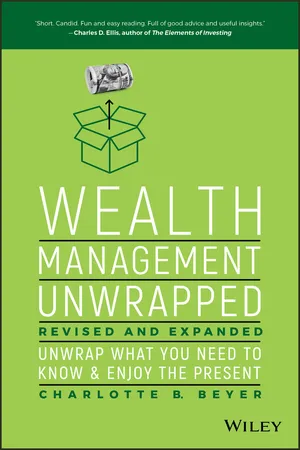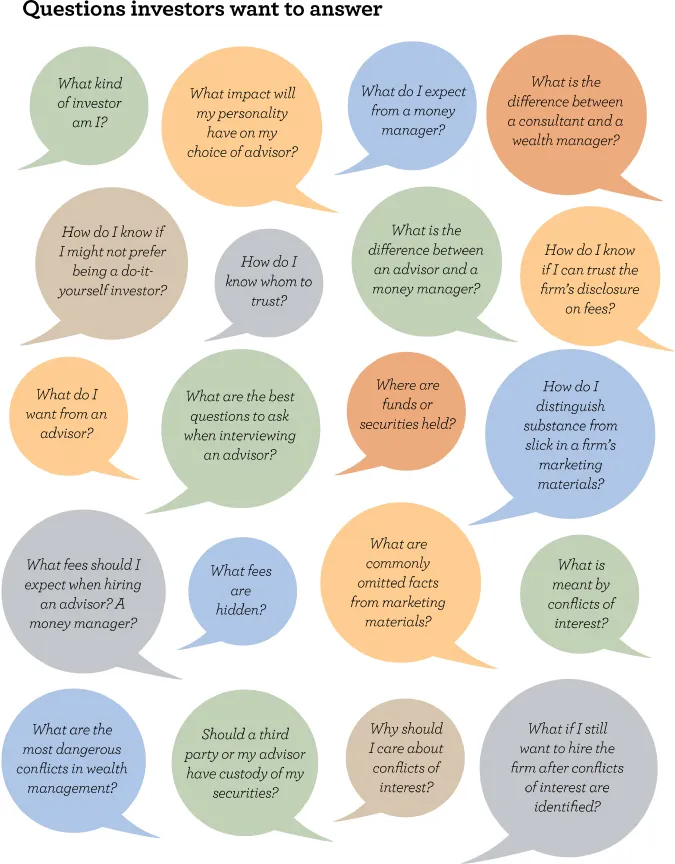
Wealth Management Unwrapped, Revised and Expanded
Unwrap What You Need to Know and Enjoy the Present
- English
- ePUB (mobile friendly)
- Available on iOS & Android
Wealth Management Unwrapped, Revised and Expanded
Unwrap What You Need to Know and Enjoy the Present
About this book
You are the CEO of My Wealth, Inc. — so Take Charge!
Wealth Management Unwrapped provides you with the tools and tips you need to take back control and more effectively manage your money. Wall Street veteran Charlotte Beyer conducts a tour of the wealth management industry, guiding you through the complexities and jargon with straightforward, no-nonsense expertise. From choosing an advisor and understanding the fine print, to fulfilling your responsibilities as CEO of My Wealth, Inc. this book offers all-in-one guidance for anyone ready to take charge of their finances. This revised and expanded version has been updated with NEW information, for women investors who seek the best advisor, older investors who confront investment choices, and a discussion on both robo-advisors and the impact of your wealth on your children. The companion website includes new interactive diagnostics to help you get started, assess your progress and then see how you compare to others who face similar challenges.
By stripping away industry tech-speak and the all-too-common self-promotion, you will:
- Understand the difference between advisor and money manager
- Learn the best questions to ask when interviewing an advisor
- Dissect fee disclosure statements and conflicts of interest
- Find out if you might be a do-it-yourself investor and learn why that might make sense for your personality
The wealth management industry has undergone massive change over the past 25 years. New services or products spring up, yet impenetrable language and marketing hype leave you with precious little practical information. In two or three hours of reading made easier thanks to the bold, often amusing illustrations, you will be a far smarter investor, not by learning the jargon but by applying common sense and insisting on clearer communications from your advisor. You and your advisor can create an even stronger and long lasting partnership by reading this book together. Wealth Management Unwrapped is like a powerful GPS, whether you're a novice or sophisticated investor, offering you a much clearer view of how to fully realize the dreams and goals your wealth now affords you.
Frequently asked questions
- Essential is ideal for learners and professionals who enjoy exploring a wide range of subjects. Access the Essential Library with 800,000+ trusted titles and best-sellers across business, personal growth, and the humanities. Includes unlimited reading time and Standard Read Aloud voice.
- Complete: Perfect for advanced learners and researchers needing full, unrestricted access. Unlock 1.4M+ books across hundreds of subjects, including academic and specialized titles. The Complete Plan also includes advanced features like Premium Read Aloud and Research Assistant.
Please note we cannot support devices running on iOS 13 and Android 7 or earlier. Learn more about using the app.
Information
CHAPTER 1
Who’s in Charge of My Wealth, Inc.?
- Questions investors want to answer
- So, who is responsible?
- Is the customer always right?
- Who’s brave enough to tell a customer, “You’re wrong”?
- Something for nothing
- You’re the boss
- Free lunch, anyone?
- Be a partner, not a victim
- Wealth management is a business

So, who is responsible?
Is the customer always right?
Who’s brave enough to tell a customer, “You’re wrong”?
- Instead of seeking the very highest return, you learn how to assess risk inside that breathtaking return.
- Instead of asking who are the “best,” you learn how to discern who will work best with you.
- Instead of insisting on “best in breed,” you learn the fallacy of that term. “Best in breed” is a powerful phrase in a sales brochure, but not a reality that stands the test of time.
- Instead of placing yourself onto an assembly line that dispenses template advice, you learn to recognize those advisors who take the time to fully understand you and your goals.
Something for nothing
Table of contents
- COVER
- TITLE PAGE
- TABLE OF CONTENTS
- FOREWORD
- INTRODUCTION
- ACKNOWLEDGMENTS
- ABOUT THE AUTHOR
- PROLOGUE
- CHAPTER 1: Who’s in Charge of My Wealth, Inc.?
- CHAPTER 2: My Money, Myself
- CHAPTER 3: Are You a Do‐It‐Yourselfer?
- CHAPTER 4: If You Don’t Know Where You’re Going, Any Investment Will Get You There
- CHAPTER 5: If You Don’t Know Who the Sucker Is at the Table, It Might Be You!
- CHAPTER 6: Resist the Razzle Dazzle: How to Judge the Beauty Contest
- CHAPTER 7: Transparency, or How I Learned to Love Conflicts of Interest
- CHAPTER 8: Courtship Is Usually More Fun Than Marriage
- CHAPTER 9: Can This Marriage Be Saved? When to Fire Your Advisor
- CHAPTER 10: Aging—Grave Concerns
- CHAPTER 11: Born Rich—A Curse or a Blessing?
- CHAPTER 12: I’m a Robot, and I’m Here to Help
- CHAPTER 13: Women with Wallets
- CHAPTER 14: The 10 Principles of Principal
- APPENDIX: Appendix A Special Message for Advisors
- INDEX
- END USER LICENSE AGREEMENT